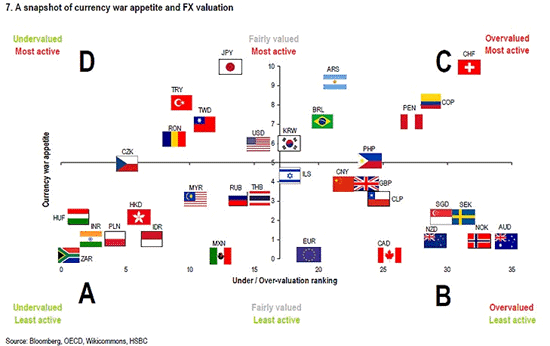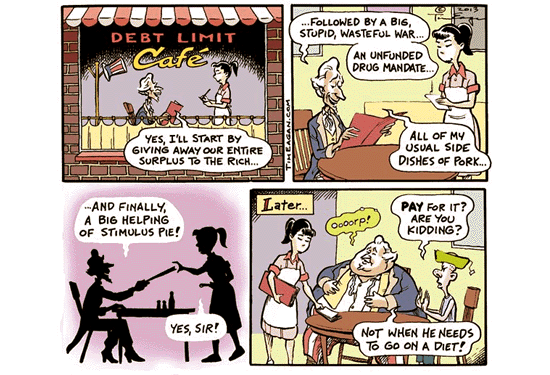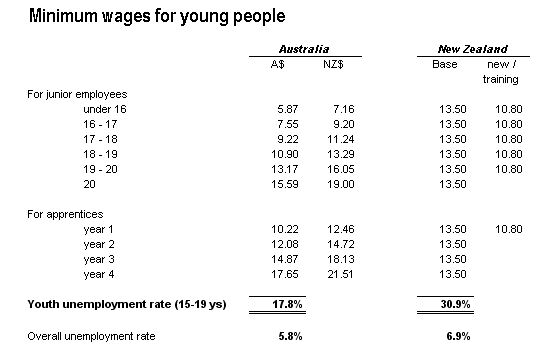
Here's my Top 10 links from around the Internet at 10:00 am today in association with NZ Mint.
Bernard is back tomorrow with his version.
As always, we welcome your additions in the comments below or via email to bernard.hickey@interest.co.nz.
See all previous Top 10s here.

1. In praise of the 'currency wars'
We are hearing a lot about 'currency wars', but is it all way overblown?
History can teach us about these things and some are suggesting we are jumping to wrong conclusions about QE.
Maybe it is not a zero-sum game which is what the critics argue. The Economist points out these may be "positive-sum currency wars".
Maybe we should like them.
Maybe NZ will be a net beneficiary? Your view?
The whole point of lowering real interest rates is to stimulate consumption and investment which ordinarily leads to higher, not lower, imports. If this is done in conjunction with looser fiscal policy (as is now the case in Japan), the boost to imports is even stronger.
Thus, QE’s impact on its trading partners may be positive or negative; it depends on a country’s trade intensity, the substitutability between its and its competitors’ products, and how sensitive domestic demand is to lower rates. The point is that this is not a zero sum game; QE raises a country’s GDP by more than any improvement in the trade balance.


2. The cost of political correctness
Our youth unemployment rate is a disgrace. It's at very European levels of 30.9%. Miraculously though, young people find jobs as soon as they get older. At 20-24, the unemployment rate falls to 12.4%, and then to 6.6% when they are 5 years older, then to 4.9% in another five years.
Australia's youth unemployment rate is half ours at 17.8%. The difference? Basically we make employers pay young people who need training the same rate as adults with work skills. Of course they will choose an adult. The Aussies recognise what needs to be done and make the appropriate adjustment. You can work out how many more young people would have jobs here if we had a youth unemployment rate the same as in Australia. The answer? 17,600 more young people in jobs. Our stance is seriously bad public policy.


3. China's income gap problem
Minxin Pei is a sceptical expert observer of Chinese politics. He is impressed by what the Chinese Communist Party is saying about addressing growing inequality at home, but deeply doubtful that they can action what they say. Without real change, instability in China seems assured.
For instance, employees and executives in monopolistic state-owned enterprises have much higher real income than their counterparts in the private sector, mainly because they enjoy many hidden subsidies. Government officials are given, as legal perks, apartments for a fraction of their market value. They have lavish entertainment budgets and unrestricted use of official vehicles for personal purposes. They receive high-quality healthcare for free and enjoy generous retirement pensions.
But such privileges pale in comparison with how these officials and their families can turn their political power into opportunities to amass private wealth. These well-connected individuals can acquire state-controlled assets, such as land, mines, and companies, at prices substantially below market, and then flip them quickly for windfall profits -- all in pro forma compliance with official procedures.
This form of crony capitalism has produced a new Chinese kleptocracy. Addressing such inequality would benefit ordinary Chinese citizens, and the privileged and the powerful would have to foot the bill. Achieving such a feat is difficult but possible in democracies as less well-off voters far outnumber plutocrats. In autocratic regimes, however, ruling elites rarely initiative such efforts.

4. Today's raw market data ...
A quick new week update:
| as at 11:10am |
Today 9:00 am |
Friday |
Four weeks ago |
One year ago |
| NZ$1 = US$ | 0.8440 | 0.8516 | 0.8354 | 0.8316 |
| NZ$1 = AU$ | 0.8204 | 0.8221 | 0.7939 | 0.7783 |
| TWI | 76.81 | 77.27 | 75.09 | 73.47 |
| Gold, US$/oz | 1,612 | 1,646 | 1,690 | 1,723 |
| Dow | 13,979 | 13,942 | 13,493 | 12,807 |
| Copper, US$/tonne | 8, | 8,197 | 8,021 | 8,370 |
| Volatility Index | 12.46 | 12.66 | 12.43 | 17.78 |

5. The evidence
Hugh P bangs on relentlessly about how well Texas has done through the recession and how well its housing markets have performed. Now his colleague Wendell Cox has summarised the evidence. The whole article is worth a read. Anything NZ can learn here? I have to agree, as a nation we tend to reject other success stories and adopt solutions being tried in cities that 'fail' (ie the UK). Hardly seems smart.
Part of the explanation for the high living-environment score is doubtless Texas’s low cost of living. In 2011, the US. Bureau of Economic Analysis put Texas’s “regional price parity,” a measurement of the price level of goods in an area, at 97.1, a bit lower than the national level of 100 and far lower than the California level of 114.8. Adjusted for cost of living, Texas’s per-capita income is higher than California’s and nearly as high as New York’s. Factor in state and local taxes, and Texas pulls ahead of New York.
More than three-quarters of the cost-of-living difference between Texas and California can be explained by housing costs. As Figure Six shows, Texas mostly dodged the real-estate bubble of the 2000s: the affordability of houses in large metro areas spiked in America as a whole but rose only modestly in Texas. A major reason that Texas real estate is so affordable is that the state lacks the draconian land-use restrictions that drive California housing prices into the stratosphere.

6. A game changer?
A new report from PwC looks at the impact of expected growth in shale oil production on global oil prices and assesses how these changes could impact the wider economy and the oil and gas industry over the period to 2035. By any measure they are bullish.
Shale Oil – the Next Energy Revolution, examines scenarios that consider the potential impact of future growth in shale oil production on global oil prices and assesses how these changes could impact the wider economy and the oil and gas industry over the period to 2035.
- Shale oil production has the potential to reach up to 14 million barrels of oil per day by 2035
- This extra supply could push global oil prices down by around 25%-40% in 2035 relative to an EIA baseline projection of $133 per barrel in that year (in real terms)
- UK GDP could increase by around 2%-3.3% by 2035 (around £30-50 billion at today’s GDP values)
- Global GDP could rise by around 2.3%-3.7% by 2035 (around $1.7-2.7 trillion at today’s GDP values)
- Presents significant strategic opportunities and challenges for the oil & gas industry and governments
Lower global oil prices due to increased shale oil supply could have a major impact on the future evolution of the world economy by allowing more output to be produced at the same cost. These effects could build up gradually as shale oil production rolls out across the world to produce an estimated rise in global GDP of around 2.3%-3.7% in 2035. This would be roughly equivalent to adding an economy the size of the UK to total global GDP in that year.

7. Robots on the farm
Last week we brought you the story that virtual fences are on the way to manage livestock. This week we can report that the future may see robots doing weed control. Better than Roundup? More here »
"Right now it's sometimes recommended that if you've got a herbicide-resistant weed population, to go out and spray more or do another application, because that will kill it, maybe," Young says.
But, Young says, more herbicide can lead to even stronger resistance and additional chemical runoff into the environment. So he and other researchers are pursuing robots as an alternative to dealing with the superweeds of the future.
Imagine fleets of small robots, constantly roaming the rows, seeking and destroying alien plant forms. Today, farmers spray herbicide on everything to kill a few weeds. Young said robots could treat each weed individually.
"The computer would know what species it's dealing with, the appropriate weed-control tool, and you'd be done with it," Young said.

8. deja vu all over again
It is cliché now to say that we live in a 'risk society.' We simultaneously celebrate 'risk-takers' and blame those who undertake 'risky speculations' without much pausing over the contradiction. Our governments try to regulate risk out of society, at the same time try to encourage the development of new start-up businesses. We have an odd relationship with risk. But then again, we always have.
Freaks of Fortune, by Jonathan Levy, is a history of the United States looked at through Americans’ evolving conceptions of financial risk. It is reviewed by Steve Waldman:
There’s a running refrain on Battlestar Galactica: “All this has happened before, and all this will happen again.” One of the delights of Freaks of Fortune is to learn just how true that has been of finance:
• Following the crisis of 2008, it has become common to call for a separation between “speculative” and “safe” finance. The so-called Volcker Rule would prohibit banks from making certain kinds of risky investments. More radical proposals would bifurcate the financial system into safe “narrow banks” that invest only in government securities and investment funds that would function without any form of government insurance. All of these proposals echo the Depression-era Glass-Steagall Act, which imposed a separation between “safe,” federally insured “commercial banks” and risky “investment banks.” But Glass-Steagall itself is an echo of the status quo prior to 1873, when banks were divided into “savings banks,” intended to preserve the wealth of ordinary people and restricted to conservative investments, and “commercial banks,” the risky, freewheeling profit-seekers. In the 1870s, as in the 1990s and 2000s, the managers of “safe” banks lobbied and innovated and cheated around restrictions on the use of funds in their care.
• Private mortgage-backed securities, with their slicing-dicing reassignment of loans to unidentifiable groups of investors, are often described as novelties. In fact, Levy points out, “mortgage debentures” that bundled, tranched, and resold mortgage cash flows were a staple of the 1880s. They were justified on the same theories of diversification that would be dolled up with math and trotted out again a century later. Mortgage lenders of the Gilded Age bore no resemblance at all to the George Bailey–style local banker. New York financial firms held western mortgages acquired through brokers. To borrowers, a mortgage was a faceless master.
• Financiers have evaded accountability with appeals to the quantitative, statistical, “scientific” nature of their art long before supercomputers and stochastic calculus. In 1877 the president of the Equitable of New York refused to justify his firms’ valuation practices to a regulator: “There are certain fundamental rule[s]…which can only be understood by actuaries.” When such appeals proved insufficient to deter inquiries, a captured New York legislature explicitly stripped policyholders of the right to ask.

9. Job losses
Our story about job losses got a lot of reader support. Unions responded saying they would help (of course.)
We are keeping a tally of reported job losses and we are asking readers for help keeping track of them. It is just a crude list of announcements - no-one really thinks the Mainzeal employees will actually be out of work for long, if at all. But political parties have made a big deal about the issue and we want the evidence, and suspect it is out there.
But the only problem is that no-one has actually reported any losses since we launched it. I did expect it to gather regular evidence.
Does that mean the few that are being reported are being over-hyped? Or perhaps you have forgotten because the story announcing it is now off our busy home page? Adding this reminder here is our attempt to keep the issue current.

10. Today's quote
"I'm living so far beyond my income that we may almost be said to be living apart." - ee cummings
Dairy prices
Select chart tabs

11. woops, nearly forgot ...
Clarke & Dawe and the August scores.
12. Bonus for Bernard, the mad cyclist
I know the vid is an ad, but forgive me - it's from a town I lived in for more than 10 years so I have a soft spot for it, and besides it will make much more sense if you read this story first.
13. Westpac limits insurance
Westpac Australia as told staff that they are not to sell residential house insurance cover to homeowners in floodzones unless those homeowners have a mortgae with the bank. Cover for home owners is starting to get pretty selective just as premium costs are starting to rise fiercely. As most of the NZ domestic insurance industry is Australian owned, and few reinsurers will be applying a rating or risk difference between NZ and Australia, our premiums will probably follow Aussie risks as much and Kiwi ones.
53 Comments
Great link #1 David.
Currency wars work for those who play the game of devaluing. Those who sit on the sideline get hammered. This section stood out for me.
"What are the lessons for today? The key insight of Mr Eichengreen’s work was that the more countries abandoned gold, the more positive become the spillover effects: "what are now referred to as currency wars were part of the solution, not part of the problem." The analogy for today is that countries whose currencies are rising because of easier foreign monetary policy should ease monetary policy as well, assuming they, too, suffer from weak demand and low inflation.
Ie NZ needs to get involved if it wants to benefit from these currency wars.
cheers
Bernard
Benefit from currency wars - I think there's an oxymoron in there somewhere :-).
by the way. Great Top 13 today David. Loved the Bike Valentine links/video.
cheers
Bernard
#12. Is that Auckland? Good to see the Jaffas know how to ride a bike. Could that be a solution to the traffic problems, or should business and industry relocate to Christchurch( bearing in mind NZ strides an active tectonic zone)?
The currency chart in the first item shows the Chinese currency CNY as being overvalued??
It's also on the least active side even though they have a USD peg??
Shale oil to boost growth:
“Oil production technology is giving us ever more expensive oil with ever diminishing returns for the ever increasing effort that needs to be invested,” writes Raymond Pierrehumbert, basing his assessment on American Geophysical Union (AGU) data on the untapped shale oil reserves of the United States.
According to the AGU, there are under 3 trillion barrels of shale oil in the U.S. with a 1-2% recoverability rate. Oil trapped in shale formations requires breaking up the substrate or heating it to high temperatures.
While oil industry advocates predict endless oil abundance, geophysical data suggests the opposite scenario. Roughly 1/3 of U.S. shale oil reserves would meet consumption needs for only two years based on 2011 rates. Drilling frequency has increased five times since the year 2000, but the returns have remained static.
The U.S. is also unlikely to surpass Saudi oil production, which exceeds U.S. production by 3.5 million barrels a day.
http://mobile.slate.com/articles/health_and_science/science/2013/02/u_s_shale_oil_are_we_headed_to_a_new_era_of_oil_abundance.html
#5
Proffessor Albert Saiz
I process satellite-generated data on terrain elevation and presence of water bodies
to precisely estimate the amount of developable land in US metro areas. The data shows
that residential development is effectively curtailed by the presence of steep-sloped
terrain. I also find that most areas in which housing supply is regarded as inelastic are
severely land-constrained by their geography. Econometrically, supply elasticities can
be well-characterized as functions of both physical and regulatory constraints, which
in turn are endogenous to prices and demographic growth. Geography is a key factor
in the contemporaneous urban development of the United States.
Geography was shown to be one of the most important determinants of housing supply inelasticity: directly, via reductions in the amount of land availability, and indirectly, via increased land values and higher incentives for anti-growth regulations. The results in the paper demonstrate that geography is a key factor in the contemporaneous urban development of the United States, and help us understand why robust national demographic growth and increased urbanization has translated mostly into higher housing prices in San Diego, New York, Boston, and LA, but into rapidly growing populations in Atlanta, Phoenix, Houston, and Charlotte.
The Geographic Determinants of Housing Supply
Albert Saiz∗
(Forthcoming: Quarterly Journal of Economics)
January 5, 2010
Jh – You don’t need to be a professor to know Geographical constraints’ increase costs (this can be different to raw land value). Not only does slope increase costs, but so does soil type, eg marshland etc. This extra development cost would normally result in the raw land being worth less, but this might be countered by the land having an extra amenity value beyond the cost eg slope is more costly to develop but might offer panoramic views. Many geographic features also elicit a corresponding regulatory response eg hills around a city having a green belt zoning. Also houses that have a higher amenity value also tend to be purchased by people with a higher income so the medium multiple to income is consistent.
However having done the analysis on a subdivision in NZ, and all things being equal, which the soil type and slope was, the present regulatory rules in NZ added 100% to the cost of what that same subdivision could have been developed had the Texas regulatory rules been used. Geographical constraints’ can be hard to change, but the regulatory extra costs (which only add cost and no extra amenity value) should be easily removed, if it wasn’t that these costs support a bureaucracy that is dependent on them.
#5
What is notable is the prominance of Wendell Cox's article on Google and lack of comments.
Has the smell of the Kock Bros all over it.
Wendell Cox is the principal at Wendell Cox Consultancy and has worked as a consultant for a variety of corporate-funded and Koch Family Foundations-funded think tanks. These include theHeartland Institute, the Heritage Foundation, the Texas Public Policy Foundation, the Independent Institute, the Maryland Public Policy Institute, the Mackinac Institute, the Reason Public Policy Institute, the Evergreen Freedom Foundation, the Georgia Public Policy Institute, and the Cato Institute, among many others.[1]
#7 - yes indeedy. Old farming friend used to swear by the use of a 7-iron for california thistles, and he retired from farming with a 3 handicap.
I'm sure one of the robots could be taken out to Clearwater, have its Neural Learning algo's tweaked to 'learn by the back nine or the 19th is at the bottom of yon Lake fer you' mode, and begin work on Maggie's Farm at 0001 the next morning.
Dan Suarez 'Kill Decision' is prolly required reading before we teach these little boogers to learn from each other, though....
Re number 1,
I note the following in the economist article you link to:
The analogy for today is that countries whose currencies are rising because of easier foreign monetary policy should ease monetary policy as well, assuming they, too, suffer from weak demand and low inflation.
The article makes sense in suggesting the QE programmes undertaken by many countries have no doubt helped their own economies, but also the world economy on balance. Demand in the US, Europe, the UK and many other places would have been a lot worse without it; as would asset prices and unsustainable private debt.
Bu there seems a clear lesson that we would be better off if we also played the game; otherwise we are a clear loser from the currency appreciation result of not playing.
Bu (sic) there seems a clear lesson that we would be better off if we also played the game; otherwise we are a clear loser from the currency appreciation result of not playing.
Well, how much more unsustainable debt can Kiwis take on board, without pushing unproductive retail and dwelling sales beyond all, but the richest minority, and damning average citizens to debt fueled penury?
Stephen,
I think we are in loud agreement. If the US had not had QE, then its own asset prices would almost certainly have stayed low, deflation would likely have been worse; as would unemployment, foreclosures, bank failures, and consumption leading possibly to the next depression. All of that would have had knock on effects to the rest of the world. So o balance, their printing has been good for them and the world.
The UK's symptoms were slightly different; with failing banks, and a financial services collapse (by far their leading industry) leading to lower incomes, low consumption. Europe clearly has had country specific problems.
Many of the other countries, including the Swiss, Chinese, Japanese have reacted to the appreciation of their currencies by printing.
Inevitably all that printing has not remotely stayed domestic; and far more than is good for us has ended up here, both as public and private debt; or as asset sales. Indeed in the GFC the government has been the worst offender in soaking it up. So there's been both a loss of wealth (with increased debt and loss of assets), and a loss of productive capacity due to the currency.
APN in crisis as board set to walk
- BY:DARREN DAVIDSON
- From:The Australian
- February 18, 2013 12:00AM
APN News & Media has been thrown into deep crisis, with chief executive Brett Chenoweth, chairman Peter Hunt and three non-executive directors believed to be considering tendering their resignations as they face a block vote against a proposed capital raising.
The extraordinary move, which could happen as early as this morning, comes after an emergency board meeting was called yesterday where all the independent directors agreed a capital raising was required immediately to reduce debt levels of about $470 million.
http://www.theaustralian.com.au/media/apn-in-crisis-as-board-set-to-wal…
#5 This is a no brainer. If the cost of housing is low then the cost of living is also low . How can a good quality fo living be achieved if you have to pay 60% or more of your income on your mortgage or rent ???
Instead of chasing a "living" wage in Auckland, the trade unions should ask instead for affordable housing cost ie cost of a house not more or around 3or 4 times income. IF housing cost is low, it then leaves more income to pay for a better quality of life.
Lower cost of housing can be achieved if only or politicians has the guts and to allow more supply of land and higher restriction of credit conditions. Simple economics 101 shous that if you increase supply, price will fall. It is Auckland Council refusal to extend the Metro limits that restrict supply and cause price to stay high and go higher when there is increase demand. The Trade Unions friendly Council is purposely looking into the wrong reason for high housing cost and therefore low quality of life, while the Trade Unions itself keeps barking at the wrong shadow by asking for "living wages" .
Pray tell me how will an increase in wages (eg 50%) help improve living standards if cost of housing and rental increases just as much ???.
When the authors of #6 write "will" instead of "could" or "has the potential to" they will transform from spruikers into analysts.
No 5
Over the last 10 years, Wendell Cox Consultancy has been the attack dog for groups opposing public transportation projects -- especially light rail and commuter rail-- across the country. On his Web site, Cox takes credit for helping derail light rail projects in Milwaukee, Chicago, Phoenix, Seattle, St. Louis, Denver, and Salt Lake City, as well as a high-speed rail project in Florida. (In heview of Cap Metro and VIA, Cox criticized both agencies for reserving funds for light rail. He also opposes the proposed Georgetown-to-San Antonio commuter rail line). Cox and a few other libertarian policy types "have made a whole industry of debunking any kind of investment in public transportation," says Roy Kienitz of the Washington, D.C.-based Surface Transportation Policy Project. "It's all the same stuff, the same set of statistics, generated mostly eight to 10 years ago, that are recycled over and over again."
Since founding his company in 1985, Cox has been on a crusade against publicly subsidized transit, government spending, unions, regional government, and aggressive land use planning. "The first thing we need to do," Cox told the Chronicle, "is get away from ideology and wishful thinking ... and start planning transportation systems based on demand." That means cars, cars, cars. "There is this view, and it's particularly extant in Austin, that we can force the city to be more compact and therefore force people out of their cars and onto transit, and that is absolute madness," said Cox. "It is simply not going to happen." --N.B.
Im sure glad I dont live in the USA. We wont see "we will force" ie public planiing...price and availability will do that...the so called free market at play...
regards
Worth a comment on #2.
Not only is youth unemployment disproportionately high , the steep rise coincided exactly wiht the removal of youth rates. It is the law of unintended consequences writ large. Sue Bradford created this mess for the kids and then left the house.
Remains to be seen if the Nats slight wind back will reduce the proble a bit.
#6 ignore engineering and geology = live in la la land.
regards
#9 One thing about job losses is jobs that are not replaced when someone moves on...the job is lost just like if they had been sacked, except they were not.
Mainzeal I know 3 ppl, I know one had a job once he got his tools out....I havent caught up with the other 2 yet...
regards
#9 One thing about job losses is jobs that are not replaced when someone moves on...the job is lost just like if they had been sacked, except they were not.
Mainzeal I know 3 ppl, I know one had a job once he got his tools out....I havent caught up with the other 2 yet...
regards
#6 Someone(s) must have paid PwC an awfully large amount of $ for that piece of doo doo...The obvious glaring item I see no correction for is decline....so 90mbpd today could be down to 50 mbpd y 2035...and we get maybe 12 to replenish...still 3 times short, let alone where demand wants to be..
Its complete and utter boll*cks IMHO, who the hell pays for such tripe?
regards
#2 so when the youth replace the older ones at lower rates, what happens to the older now unemployed, do they just disappear into thin air, or go bush or what?
Or do they then claim a benefit at a higher rate because they are more likely to have dependants. So the price of a youth wage then being a bigger cost on tax payers?
$14 billion is repatriated over seas in profits, but industry can't afford wages. Bollocks.
Well said, not only that but employers are complaining that we need to import cheap labour from overseas as NZers cost too much....which of course also means a decent % of wages is sent home so not spent in NZ. Simple pay the living wage or dont do the job in NZ.
regards
#12
incase anyone hasn't seen this:
Christchurch, the cycling city
Commuters pedal down Manchester Street on their way to work in 1954. In the early 20th century Christchurch, with its wide flat streets, was nicknamed ‘Cyclopolis’ because so many people in the city rode bikes.
Christchurch – mostly flat – was nicknamed ‘Cyclopolis’ in the early 20th century. In 1924 the city council’s motor inspector estimated that there were 40,000 cyclists in the city – half the population. A 1936 traffic census found 11,335 cyclists passed one corner of Cathedral Square between 8 a.m. and 5.30 p.m., a rate of 19 per minute. Christchurch was home to 50,000 of the 250,000 cycles in New Zealand in the late 1930s.
http://www.teara.govt.nz/en/bicycles/1/4
New research out of the University of Connecticut shows that making room for parking in cities only leads to more cars, and less people and economic development.
Building on research from the University of Pennsylvania that validated the idea that more space for cars in dense cities translates to less space for people, Chris McCahill and Norman Garrick "found that cities with higher rates of driving have fewer people – a difference of more than 4,000 people per square mile for each 10 percent change in automobile use," in work published recently in Urban Design International.
The authors look at the histories of six cities that bolstered their parking beginning in the 1960s to "support economic development and help their cities compete with the surrounding suburbs."
"If the function of parking in these places was to enable growth and development, the data suggests they were abysmal failures," note the authors. "The number of people and jobs dropped by as much as 15 percent and the median family incomes fell by 20 to 30 percent in some places. Today, these places still struggle to compete in their regions."
However, in the three cities that changed course in the 1980s to limit the provision of parking, the authors found a different outcome. "Even as they cut back on surface parking, the number of people and jobs climbed upward, as did incomes. Less parking in these places has meant the urban fabric can be stitched back together and there is more space for shops, restaurants, jobs and other things that make cities great."
http://www.theatlanticcities.com/commute/2013/02/cars-and-robust-cities…
@ Hugh and Canterbury Unite:
Owen McShane
"During my visit to Houston there was much fuss about a high-rise apartment being build next to a very plush community of single family homes. The pro-zoning elite were using this as an argument for a comprehensive city plan complete with zoning and the usual host of regulations and controls.
However, people who buy into a neighbourhood controlled by a Homeowners’ Association know very well that the edge properties are vulnerable to such unexpected activities and hence sell at a considerable discount. Buyers pay their money and accept the risk."
Houston – the well-planned City without a Plan
..........................
So it's o.k to build out the old lady in Sydenham (bank and developer using OPM) because her old house is "at a considerable discount"..?
jh ....note that Greater Houston has a mix of zoning, no zoning and deed restructions, so the kerfuffle you speak of occurred in a no zoning area.
.......................
Too bad if you're on a margin eh Hugh. That's the problem with "spontaenious organisation". It is the law of the jungle where the strong play on the weak : "everyone has their realestate agent storie" etc,etc.
Shame on you all Hugh.
Q: The developers claim that this will not be an intrusion on privacy since the residences will be “above the treeline.” What’s wrong with that?
The first five and a half stories, consisting of retail space and a parking garage, will have set backs of 10 feet on the East and South, within a few feet of neighboring homes on Wroxton and Southampton Estates Drive. The setback from the front edge of the curb on Ashby will be 27’10” (steps for 5 units will protrude into this space) and 54’ from the front edge of the curb on Bissonnet,. Furthermore, while the neighborhood contains numerous beautiful, live oak trees, the tree canopy is not continuous. Residents of the project will be able to look directly into many yards and windows of the houses in the neighborhood, and the project will be clearly visible to hundreds of houses in the neighborhood.
Q: What are the long-term implications of this project?
A: This is not the only site adjacent to an established neighborhood in Houston that is without protection. Our neighbors in other parts of the city have suffered from willy-nilly construction. Other nearby parcels of land in close proximity to Ashby and Bissonnet are also at risk for high density development that would overburden the local infrastructure and damage the community. This is an opportunity to affect the city’s growth, but in a positive way that does not destroy the values that have been carefully built up by the city’s residents over the decades. Urban density is a reality, but it should not occur at the price of urban chaos.
JH if you do not let cities grow up or out when there is considerable demand like Christchurch and Auckland is experiencing, then you get huge increases in house prices with the obvious consequences for poverty.
My preference is that the old lady in Sydenham loses some sunshine and views if it means children get better fed and live in a warm modern affordable housing.
That's a foolish - and fatally flawed - argument.
Until you curb population in absolute terms, and curb resource-consumption per head, you're wasting your time.
'Better fed' requires farmland.
'Warm, modern, affordable'? Why so many competing variables? We can't all have 'modern' - there isn't enough planet left to replicate what we have now - nothing like it. So we have to retro-fit our existing stock. Warm? Again, retro works, as does passive solar - but the urban sprawl some wish for is not sustainable unless future-proofed, and upward is a recipe for disaster.
You insist on failing to ascertain what poverty actually is; which is why your argument fails the same test Hughey's does,
The demand is however effectively infinite as long as population grows and work concentrates, you just turn the city into one vast sewer, while rural population declines. That however is going to change.
regards
JH if you do not let cities grow up or out when there is considerable demand like Christchurch and Auckland is experiencing, then you get huge increases in house prices with the obvious consequences for poverty.
.................................
Great Brendon but the reallity is that 80% of our population growth in the last couple of decades has been the net inflow of non NZ citizens. So while it is nice to be accomidating, who are we accomidating; where is the profit going and who is loosing out? There has been intensive lobbying for immigration and National has said yes, while contradicting the advice of it's own Savings Working Group.
Singapore has a better system as in the case I cited private interests are able to build out one single woman, whereas in Singapore the state would tear down the whole block and rebuild along architectecturally sound principles, keeping the capital gains for public use rather than flying helicopters in Fiji.
PDK your solutions fail the empiracal test while Hughs do not. Theories are only good if they can proven. Note I am not saying that peak oil etc, is not proven. Just these urban containment solutions are not working just as Hugh said they would not.
People should be free to decide for themselves how they will respond to peak oil.
PDK shows you maths, data science and engineering. Hugh shows you the "answer" of a wannabe demagouge who has demonstrated time and time again rejection of said maths, data, science and engineering because it doesnt support his fanatical and refutable viewpoint(s). Then of course Hugh's "solutions" suits your political viewpoint, so hey ho we have a solution, emperical it isnt.
Peak oil doesnt need proof in the actual event, simple maths says finite planet with infinite demand does not work its going to come unstuck, even a 16 year old should be able to understand that math.
"free to decide" spoken like a true libertarian...except we humans do best as a society a collection of ppl. And our society now is so complex that we need time (many years) to adapt to change, yet we a) fail badly at the expotential function, b) are not seeing the information to make a honest choice...the PwC pile of lies is a great example....all will be well to 2035, yeah right. I think we will ind thats badly wrong maybe as soon at 2015, and not much passed 2020 if we are lucky.
regards
Bollocks. What test?
Those 'urban containment 'solutions' were actually half-assed attempts to 'balance' growth with 'environmental impact'. You can't do that, of course. Walrus, Carpenter and Empty Beds. 'Balance' is a series of selfishly-shifted goal-posts; which brings up the second flaw in your assertion - that folk should be 'free to decide'.
I suggest you spend the morning studying the Tragedy of the Commons, then applying what it means atop this graph:
http://www.smithsonianmag.com/science-nature/Looking-Back-on-the-Limits-of-Growth.html
You can let mass free decision-making continue - and will end in chaos. Or you can all agree, intelligently, that a different paradigm is needed. A non-growth (obviousky, and the sooner the better) paradigm, with full mitigation/elimination of impacts, full reuse/recycling, and not delving into finite resources, at least until a withdrawal plan is in place. We won't do it - too many selfish people who wanttocontinue being selfish, and too many of the unselfish - think Turei - who don't understand the problem. Which are you?
PDK you have a messiah complex. I think it is great you are preparing for life without oil in your life style block out of Dunedin. But I do not want to live in a NZ run by the likes of you.
Steven, I am not agreeing or disagreeing with peak oil so stop throwing that at me. What annoys me about Greenies and I am not necessarily saying you are one of them, is they take no responsibility for their actions.
Greenies having been pushing urban containment in places like Christchurch for decades and as Hugh clearly shows it has doubled house prices and caused greater sprawl because people end up building further and further away due to unaffordable housing. Hugh has been saying this since at least 2004 and his 'theory' has since been proven by the facts. Which can clearly be seen in his annual housing affordability surveys, building consent numbers and number of lifestyle blocks.
Also this thread started on housing affordability. If you want to change it to a non growth economic model then you are free to start a new thread. But it is annoying that you keep hijacking affordable housing threads.
The problems with low-density sprawl is that the cost of building and maintaining the infrastructure needed to support sprawl is high (this cost has been increasing markedly over the last decade, just look at the cost of bitumen/asphalt for roading). The other problem is that sprawl generally forces people into automotive based transportation and increases the commuting distance, which of course leaves people more vulnerable to fuel price increases.
Looking forward, I'm not convinced that investing in further sprawl is necessarily functional or intelligent.
Yep, so Hugh et al of his ilk want to push those costs onto those who cannot afford what they will never use.
I saw a great comment on MUDs they are getting so desperate now in some parts of the USA that they have them at 75 years to build roads with a 25 year life span, kind of duh....
regards
"live in NZ" its not like there is anywhere to move to...."oh I'll move to OZ, or Canada" etc I think your worst liberatarian nightmare is coming myself....I think we'll see draconian measures instigated under "civil emergency law /poweers" like petrol rantioning within 10 years if not 5.
Greenies are not responsible for urban limits so dont blame it there. Councils have been labour or national run for decades....quite possibly you could call them NIMBIES or whatever, but Greenies, no.
You base your "affordable housing threads" on hot air and not much else, it isnt afforadble if what you spend is under writable, whcih is the point on us commenting on it.
Hugh has no reputable theory as you put it. He's a crank pushing a liberatarian type agenda seeking to take advantage of the less well off, for political gain, pure and simple.
regards
Brendan - classic denial.
"If you want to change it to a non growth economic model then you are free to start a new thread. But it is annoying that you keep hijacking affordable housing threads".
I want you to think about that sentence, please. Long and hard.No, I'm not being 'arrogant. No, I'm not being a messiah. But what part of housing affordability is not directly related to incomes, and what part of incomes is not directly related to work/energy?
Same failure as Hugh. Half the asserted equation unsubstantiated and unsubstantiable.
I'll offer an apology for highjacking the discussion about where the new deck-chairs are to be placed in the morning, if you can assure me the bows-down attitude doesn't mean the deck will be under water by then, Seriously, your comment is denial in about the same measure.
PDK if your premise is that houses have become unaffordable because of deteriorating work/energy how do you explain how houses cost 3 years work in some parts of the US (and Germany too!) while it costs 6 years work in our big cities? Hughs housing affordability surveys are expressed in energy terms, they show how many years labour from the medium worker it takes to afford the medium priced house. Is peak oil coming to some parts of the world but not others?
There is some evidence that energy is becoming more expensive, oil is above $100 a barrel. We have not seen the predicted increases in oil production. Peak oil might be coming. I would not be so arrogant to deny the possibility of peak oil. But if it takes more energy to make things like houses, why the huge variation from one place to another?
Good qestion.
Why did they call it Texas Tea? Local, sweet, relatively easy to extract, EROEI of 100 or so. Hard not to be 'rich', you'd think. Germany? I'm no economist, not my field, but I sense there has been a 'hoovering' from all the poorer EU parties, to the richer. I suspect that every Rich German is mirrored by a poor Greek.
But ultimately, you have to ask the longer-term question. A fried is just back from Mexico/Texas (worked in one, slept in the other!) says "in a word, unsustainable". The whole sprawl is based on the private car.
If wealth is underwritten by the use of energy to do work, and we can all accept that wealth migrates upwards (poor to rich, be it individuals or nations) then your ratio will represent ownership of the energy, at whatever level.
If you're serious about the actual housing being 'cheaper' (I suggest a better measuer is 'less energy-requiring') then get in touch. In genericstyle production numbers, I reckon I could turn out a modest passive-solar under-100sq/m dwelling for about $80g. We won't do it, though. Too many vested interests, at all levels. All wanting their cut. All lobbying for their exclusivity. Too little lead-time left, we go into the 'long emergency' with at least 80% of our existing stock - and infrastructure - as existing.
I would like to hear more about less energy requiring houses.
And having recently returned to NZ and needing to house a family I certainly know about. "Too many vested interests, at all levels."
Regards : )
I note with some concern this snippet from PDK in the thread above:
"You can let mass free decision-making continue - and will end in chaos. Or you can all agree, intelligently, that a different paradigm is needed"
Ok, that sounds far too much like Gubmint by an Unelected elite to me. It may be a Meritocracy (intelligence having been mentioned) but it sure ain't Democracy.
- What mechanism exists to reach the 'agreement' needed
- What of many 'new paradigms' should be up for grabs?
- Who picks said paradigms?
- Who gets to influence the overall decision?
These are not light-weight considerations, and show the sore lack of a written Constitution in our fair land.
Because (as Pinker says in his 'Better Angels of our Nature') the writers of the US constitution , having just resiled from a Monarchy, were equally concerned that a new one should not arise: and that even the new form was not to be totally trusted (all being run by Humans) hence the checks and balances imposed by fixed terms, separation of powers etc etc.
I thoroughly distrust the ideology behind PDK's comment: that Democracy is part of the Old Paradigm.....
Waymad you are right. There is this scary arrogant 'I am right and everyone has to do as I say or we are all doomed' element to PDK's arguments. I get the feeling he is the green version Roger Douglas. He certainly cannot admit to ever being wrong.
The basis of democracy is being able to convince a majority of people the best way to proceed. In a good democracy that would involve freedom of speech and intelligent debate. PDK seems to have given up on that.
The problem is that you represent - at present - the majority of voters. Note your inability to change/learn/think impartially, and the timelime on that Smithsonian graph. I've been watching the progress in both for 35 years - and we aren't going to make it as things currently stand.
I wouldn't be here, if I didn't think the correct way was to be proactive, and to educate those who haven't been told (a question I ask of the media) or who haven't the kind of thinking which makes them ask the questions themselves.
When you introduce $ into democracy - be it election funding or lobbying - it ain't democracy anymore. Sure, when we all get pissed-off enough we get an anti-nuke or a MMP movement,
Fitzsimmons 'got it', in spades. Turei doesn't. And we,re running out of time.
Did you look up the Tragedy of the Commons?
We're running out of time , you say !
..... OMG , peak time has arrived ...... there just isn't enough hours in the day , anymore ....
Thankfully we have PDK & steven to tell us how to corrrect errant our ways , and how to live right , and to give us their tofu recipes .....
Not sure what point you are intending to make by praying the tragedy of the commons in aid. It's usually used as an argument in support of enabling and protecting private property ownership, is that what you are advocating?
Sadly too many people get the wrong idea about democracy, particularly Maori.
You often hear them say "the majority walk all over the minority" but that has nothing to do with democracy.
If that were democracy, and we are proud to be a democracy, then we are proud of Hitler. The majority Germans executed the minority Jews. Is that democracy? NO
Take gay marriage and we could say our democratic government gave them their rights. But that is not true. It was the governments interference in marriage that caused the problem in the first place. What business is it of the government if i marry or not?
Democratic government is not about intefering in social issues such as marriage, it is about providing a good environment for the people to go about their activities.
The assumption is that everyone who lives in the suburbs needs to commute to the CBD. CHCH shows what happens to a city when you remove the CBD. Not much. In fact one of the few benefits of the earthquake is that it has forced many businesses to allow their employees to work from home. And amazingly, productivity is the same if not better, less traffic, less use of fuel, saves time and as one employee who was spending $40 per week on fuel, they happily told me that since being able to work from home, it was like getting a $40 a week pay rise. This is after tax and didn’t cost the employer a cent. This is the new future of the city – decentralized where you have a home, and a business, close together physically, or by digital means. After all, look how we can all communicate in these posts and yet we are ‘sprawled’ from one end of NZ to the other. There will be less travel by any means and particularly not being forced to go to work in the CBD just to subsidize rail.
Yes there is a direct link between restrictive zoning /high house prices, and that is also linked to why so many in these posts start talking transport as soon as housing is mentioned as the end goal for many high density advocates’ is to stop people using cars in favour of rail. The quickest way to achieve this is to make housing so expensive that you cannot afford any transport but shanks’s pony (rail).
Having worked in property development in Texas and NZ, and having done the comparative analysis, it does not matter whether you are into high density or low density; the cost of sections in NZ is twice as expensive as it needs to be. Present smart growth ideology is achieving the exact opposite of what it is trying to achieve. The higher house prices force people to drive to qualify, resulting in longer commute times. Lower prices, which can only start on the fringe with land purchased at its true rural value, would allow over time, for lower prices in the inner city. And therefore if you wanted to be in the inner city, you could afford to live closer in than at present. All cities have a higher density core and a lower density fringe, it’s just that in certain cities, like Houston that have less restrictive zoning, it is a darn sight more affordable no matter what form of density you choose.

We welcome your comments below. If you are not already registered, please register to comment
Remember we welcome robust, respectful and insightful debate. We don't welcome abusive or defamatory comments and will de-register those repeatedly making such comments. Our current comment policy is here.